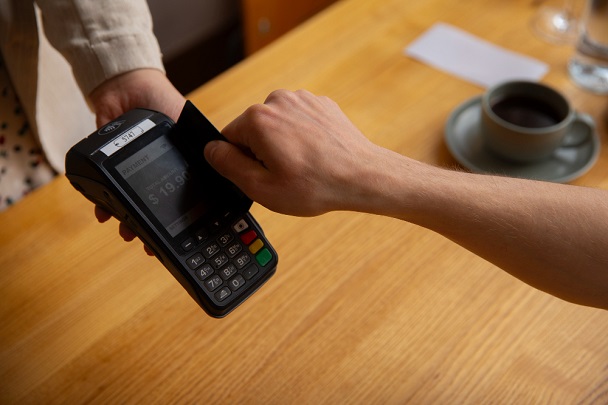
In the bustling heart of the restaurant industry, where every order and transaction pulses through the veins of the business, ePOS systems stand as the lifeline of modern eateries. This is an imperative guide in a world where data breaches are as common as daily specials.
This guide offers insights into how restaurateurs can protect their POS systems from digital threats. With cyber security becoming as essential as a kitchen’s fire extinguisher, we dive deep into the strategies that keep your data locked down as tightly as your secret recipes.
Join us as we navigate the critical path of securing your restaurant’s financial and customer information, ensuring that your establishment remains a place of trust and safety in the digital age.
Understanding Restaurant Data Security Risks

Restaurants face numerous data security risks, such as malware, that can compromise the confidentiality and integrity of their valuable business information. Proper menu management is essential to mitigate these risks.
Restaurant owners must be aware of the risks associated with malware and take proactive management measures to safeguard their data while ensuring efficient menu ordering.
Payment Card Fraud, Data Breaches, and Theft of Sensitive Information
One significant risk that restaurants encounter is payment card fraud, which can compromise their business and POS data due to malware. Cybercriminals are constantly devising new techniques to steal credit card information and business data from unsuspecting customers. This highlights the importance of restaurant ePOS security to protect against malware attacks. These criminals may use skimming devices or intercept payment data during transactions, leading to financial loss for the customer and the restaurant.
Data breaches are another primary concern for restaurants. In restaurant POS security, these incidents involve unauthorised access to sensitive business data, such as names, addresses, phone numbers, and even payment details. A single breach can severely damage a restaurant’s reputation and result in legal consequences.
Malware Attacks and Phishing Attempts
Malware attacks pose a severe threat to restaurant data security. Malicious software can infiltrate point-of-sale (POS) systems or other devices connected to the network, allowing attackers to gain control over sensitive information. Phishing attempts are also common in the hospitality industry, where cybercriminals trick employees into revealing login credentials or other confidential data.
Employee Negligence and Insider Threats
While external threats cause concern, internal risks cannot be overlooked either. Employee negligence or insider threats can lead to data breaches or unauthorised access to sensitive information. This might occur due to inadequate training on security protocols or disgruntled employees seeking revenge.
By understanding these various data security risks restaurants face, owners can implement appropriate measures to protect their valuable information from falling into the wrong hands.
Benefits of Modern POS Systems for Restaurant Security
Advanced Encryption Techniques
Modern POS systems utilise advanced encryption techniques to safeguard sensitive customer information during transactions. This means that when a customer makes a payment, their credit card details and personal data are encrypted, making it extremely difficult for hackers to intercept and misuse the information. With this added layer of security, you can provide your customers with peace of mind knowing that their data is protected.
Secure Storage Options
Cloud-based POS systems offer secure storage options for your restaurant’s data. These systems provide regular backups, ensuring that you can quickly restore your information even if there is a system failure or data loss.
By storing your data in the cloud, you minimise the risk of physical damage or theft that could occur with traditional on-site servers. Cloud storage allows you to access your data from anywhere, providing convenience and flexibility for managing your restaurant operations.
Integrated Inventory Management Features
POS systems with integrated inventory management features help prevent ingredient theft and wastage by accurately tracking stock levels. With these features, you can monitor the usage of ingredients in real time and receive alerts when stock levels are low.
This not only helps prevent theft but also ensures that you have enough inventory to meet customer demand. You can reduce costs and streamline operations by efficiently managing your inventory through the POS system.
Tips for Safeguarding Restaurant Data against Fraud and Breaches
Regularly Update Your POS System Software
Keep your restaurant’s data secure by regularly updating your POS system software. These updates ensure you have the latest security patches and bug fixes, reducing vulnerabilities that hackers could exploit.
Train Employees on Best Practices
Teach your employees about best practices for password management, recognising phishing attempts, and handling customer data securely. Educating them on these topics empowers them to be proactive in protecting sensitive information.
Implement Multi-Factor Authentication Methods
Implement multi-factor authentication methods to add an extra layer of protection against unauthorised access. This means requiring users to provide multiple forms of identification before accessing sensitive data. It adds a different level of security beyond just a username and password.
Use Strong Passwords
Encourage employees to use strong passwords that are difficult to guess. A strong password should include uppercase and lowercase letters, numbers, and special characters. Avoid using easily guessable information like birth dates or common words.
Limit Access to Data
Restrict access to sensitive data within your restaurant ePOS only to those who need it for their job responsibilities. Limiting access minimises the risk of unauthorised individuals gaining entry to confidential customer information.
Encrypt Customer Data
Encrypting customer data is crucial in safeguarding it from potential breaches. Encryption converts readable data into a coded form that can only be deciphered with the proper encryption key. This ensures that even if someone gains access to the encrypted data, they cannot understand it without the key.
By following these tips, you can protect your restaurant’s valuable data from fraud and breaches, maintaining customer trust and ensuring the smooth operation of your business.
Enhancing Payment Card Security with Secure Online Access
Utilise Tokenization Technology for Secure Transactions
To safeguard your restaurant’s data during online transactions, it is crucial to utilise tokenisation technology. This technology replaces sensitive payment card information, such as credit card numbers, with unique tokens. These tokens are meaningless to potential hackers and provide an extra layer of security.
Enable End-to-End Encryption for Data Transmission
Another essential step in enhancing payment card security is enabling end-to-end encryption when transmitting payment card details between your restaurant’s website or app and the payment processor. By encrypting the data, you ensure that it remains protected throughout the entire transaction process.
Regularly Monitor Transaction Logs for Suspicious Activity
Monitoring transaction logs regularly is vital in detecting suspicious activity or anomalies indicating a potential breach. You can identify unauthorised access attempts or unusual patterns that could signify a security threat by keeping an eye on these logs.
Implement Strong Passwords and Access Controls
Implementing strong passwords and access controls is crucial to maintaining the security of your POS system. Ensure that all employees have unique login credentials and encourage them to use complex passwords that are difficult to guess. Consider implementing multi-factor authentication for an added layer of protection.
Stay Updated with Security Patches and Updates
Regularly updating your POS system’s software and applying security patches is essential in protecting against vulnerabilities. These updates often include fixes for known security issues, ensuring your system remains secure against emerging threats.
Following these steps and implementing robust security measures can enhance payment card security within your restaurant’s POS system. Protecting customer data prevents potential breaches and fosters trust among customers, leading to a positive dining experience.
Protecting Ingredient Secrecy and Preventing Theft/Wastage
Restrict Access to Ingredient Recipes or Formulas
To safeguard your restaurant’s ingredient secrecy, limiting access to recipe or formula information is crucial. Only authorised personnel who genuinely need to know should have access to this sensitive data. By implementing strict controls on who can view and modify ingredient recipes, you can minimise the risk of unauthorised individuals obtaining valuable information.
Implement Inventory Control Measures
Preventing ingredient theft or wastage requires effective inventory control measures. Barcoding ingredients and conducting regular stock audits are essential steps in this process. Barcoding allows for accurate inventory tracking, making identifying any discrepancies or missing items easier. Regular stock audits help ensure that all ingredients are accounted for and reduce the chances of theft or wastage going unnoticed.
Monitor Employee Activities
Monitoring employee activities is another vital aspect of protecting your restaurant’s data and preventing theft. Surveillance cameras can be strategically placed throughout the establishment to capture suspicious behaviour. POS system logs can provide valuable insights into employee activities, such as order modifications, voids, or discounts that may indicate potential fraudulent activity.
By actively monitoring these records, you can quickly identify any irregularities and take appropriate action before they escalate into significant issues.
Ensuring the Safety of Your Restaurant’s Data with POS Systems & Security
To take action today, invest in a reliable and reputable POS system that prioritises security features. Remember to regularly update your software and train your staff on best practices for data protection. By doing so, you’ll be fortifying your restaurant’s defences against potential threats and ensuring the safety of both customer data and ingredient secrecy.
Protecting your restaurant’s data is crucial for maintaining customer trust and running a successful business. So don’t wait any longer – take charge of your data security now!
Best POS software












